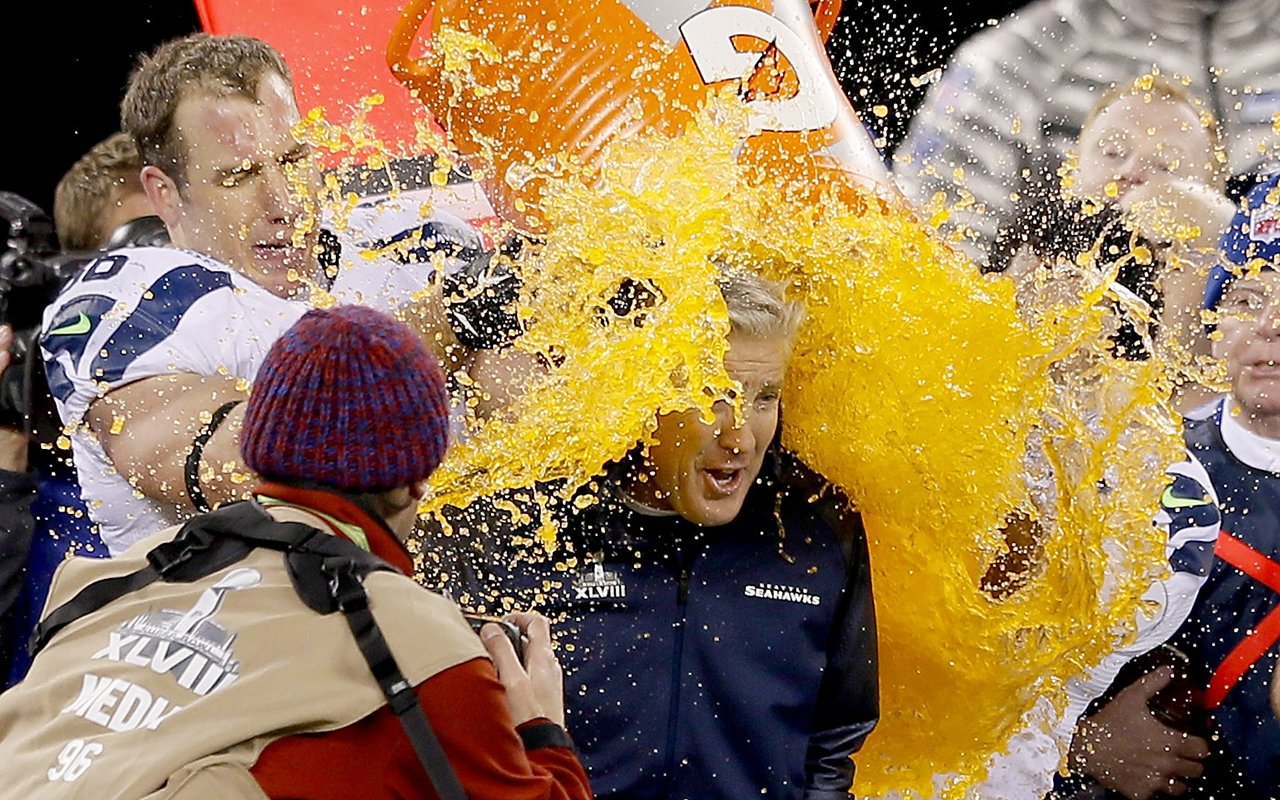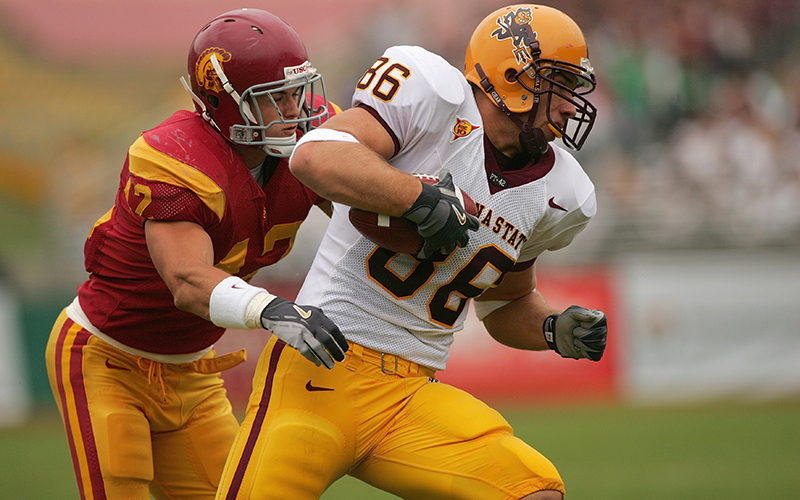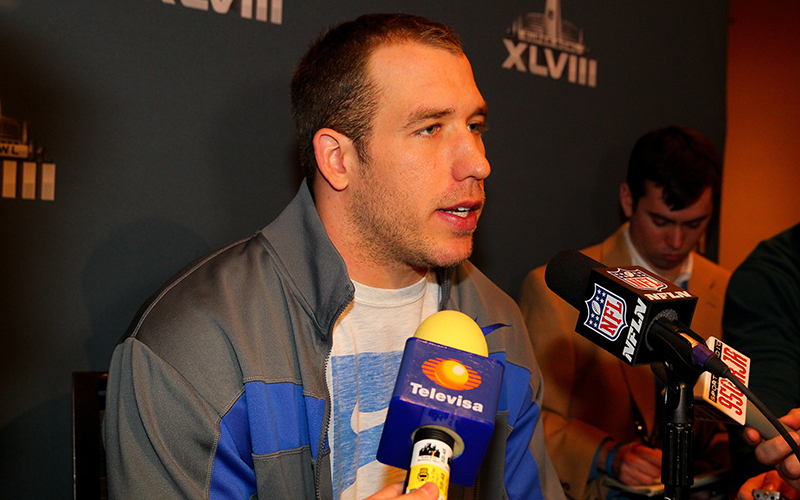Eighteen months ago, Carpenter formed his own company, under the umbrella of financial institution Muriel Siebert, so that he could offer financial advice to former teammates and contacts he made through athletic or business engagements.
He’s familiarized himself with the inner workings of finance over the last year-and-a-half, and attests he’s even seen and heard of akin issues victimizing players in the National Hockey League. Carpenter’s wife, Marina, tends to the Arizona Coyotes as General Counsel and Chief of Staff.
“It’s very easy to suggest, well, a lot of athletes go broke because they’re young. That’s a true statement,” said Carpenter, insisting it’s only half of the complete picture. “A lot of athletes go broke because they have a very short amount of time to make money, (and) it’s hard to budget over the long-haul, and many athletes who have been playing football, or baseball or basketball or hockey at a high-level for a long time, they don’t have a lot of other skills outside of their sport, so it’s hard for them to make the transition back to the real world.”
Carpenter’s utterance rings hollow on most people’s ears: “The amount of guys that are either dead or in jail is heartbreaking,” he said.
But, it’s not flagrant, it’s just difficult to comprehend. It’s part of the mess that stems from misunderstanding or misjudging critical aspects of the financial system. Often, players are squared up with inherently uncontrollable circumstances, Carpenter said, that fester into larger issues, particularly for players achieving first-generational wealth.
“Their entire existence is wrapped up (in) their athletic identity,” Carpenter said. “You have kids that come from different backgrounds, such as me. … People usually think (of) one demographic, but there are plenty of — for a lack of a better term — white players who fall in the same trap. … I have a mom who has been married and divorced four times. I have seven siblings. I have a dad who’s been in and out of jail. My parents have never been homeowners. … We don’t grow up in an environment where we’re used to money, and so therefore we don’t truly understand the financial system.”
Carlson, the fraud attorney, is well-versed in the seriousness of this financial malady. He was featured in a 2016 episode of “60 Minutes” in a segment called “Thrown For A Loss,” which was centered around several NFL superstars losing a whopping $43 million in a risky venture that was originally proposed by a financial adviser registered via the NFL Players Association.
Carlson credits the NFLPA for the strides it has made in the interim but, of course, was not impressed by the faulty application process that admitted corrupt financial figures, like Jeff Rubin, to begin with.
“Many years ago, there were a lot of cases where, arguably, the NFLPA might’ve missed some red flags,” said Carlson, magnifying many of the improvements the union has made in the four years since falling under the nation’s watchful eye.
The NFLPA has tightened its eligibility requirements, boosted its background investigation and added further criteria that individual and institutional advisers must meet to pass registration. This is in addition to player resources that have grown exponentially over the last several years.
Carpenter, however, is not totally convinced that athletes are fully-aware of the chips at their table. In conversation with current players, he’s learned that financial discord subsists, primarily due to a lack of instruction, or absence of effort.
“All you have to do, if you’re a player, is create a login and your username and your whole financial picture comes up on that NFL benefits page,” said Carpenter, referencing nflplayerbenefits.com. “The vast majority of NFL players I meet have no idea that website even exists.”
And so, again, the moral of the story reverts back to Miller’s looming, lasting image: it’s not enough to just flaunt financial advice, it’s imperative to instill financial education and financial literacy in the next generations.
“I’ve never been that much of a vocal leader, I’ve always been a leader by action,” Miller said, “so I hope that being an adviser to as many players as I can, and delivering a service that I think they need and I know they need, I hope I can enact change that way.”
Education trumps the wicked
The stark reality of this rife misfortune is that it’s going nowhere any time soon.
As long as professional athletes, entertainers, lottery winners and others continue to bank mammoth amounts of money in a short window, dishonorable people will spare no effort to manipulate and steal their milk and honey.
“It’s something that always needs awareness,” Carlson said. “If you neglect it for too long, it’s going to get really bad again. It’s something that should always stay in the spotlight.”
The truth makes Miller’s mission more purposeful because education expansion is the crux of an indelible solution, and one of the company’s core values.
Since inception, Averill said, AWM has functioned steadfast in its belief that education equates to power. The forthcoming plan, with Miller leading the charge, is to approach the NFL market of financial advice in precisely the same manner.
The company has predominantly worked with established veterans and retired players in the past because their financial portfolios typically have the most complexities, but this blueprint will certainly be geared toward the professional athlete who possesses zero financial acumen, as well, because such players are often the most susceptible to outside influences.
“It’s really a perfect storm,” Carlson said. “You have very young people earning a lot of money, who don’t have investment experience, typically don’t have investment education and they also don’t know who to trust.”
It’s the same set of conditions that Miller faced as a rookie with the Raiders, when he didn’t have answers because he wasn’t raised in an overly affluent home.
“If you aren’t exposed to it, you just don’t know what some of that stuff means,” Miller said, “you’ve got to search for answers, and the earlier you do it the better.”
A significant piece to this puzzle rests on an athlete’s shoulders. People, after all, are a product of their own environment.
“If you look at our pop culture, just turn on any music that (players) are listening to, it’s about spending money, it’s about living a certain lifestyle, it’s about having baby mamas and jewelry, and all types of things. And, those things don’t lead to financial success,” Carpenter said. “I’m a huge proponent that fiscal responsibility and finance (should be) taught at a much younger age, and spend a lot less time on the utopian idealism teaching points that come from universities and trickle down to high schools, middle schools and elementary schools.”
Carpenter is firm in his stance: Every professional athlete is equipped to control their financial wellbeing, but they must be self-motivated to do so. It kicks off with reading their own bank statements, genuinely wanting to learn about all of the resources provided by their player’s union, surrounding themselves with like-minded companions committed to serving a players’ best interest one-hundred percent of the time and, simply, caring enough about life beyond the spectrum of athletic performance to put temptations to rest in realtime.
“The easy answer is to talk about education. The easy answer is to talk about financial literacy. The hard thing to do is to talk about the ugly truths,” said Carpenter, adding it’s exhausting to watch and listen to athletes and critics blame the system, rather than individual autonomy. “At what point in time are players responsible for their own financial decisions?”
Carpenter also acknowledges there will always be more the NFLPA, for instance, can do to protect its current and former players. But he doesn’t view increased involvement in a player’s financial-life as a realistic option to remedy financial-related issues — mainly because athletes aren’t inclined to want a governing body dictating their financial protocol.
“If the NFLPA got involved and said, ‘Hey, we’re going to crack down. We’re going to start making you guys be fiscally responsible. We’re going to start deferring some of your money’…then you’d have a lot of players pissed off,” Carpenter said.
A degree of separation already exists between the NFLPA and its constituents because of what can be classified as somewhat poor timing, and implementation of certain programs that are intended to disseminate financial advice.
Over the course of a 17-week regular season, players are afforded weekly opportunities to sit in on webinars and receive personal finance coaching.
The most troubling aspect? Carpenter said this instruction is often made available on Tuesdays, the lone true off-day for players from August to January.
“Very few players participate in these meetings, and you can imagine why,” said Carpenter, detailing a grueling travel and practice schedule that players tolerate week-in and week-out: An athletes jam-packed timetable leaves little room for personal aspirations.
Miller served as his respective organization’s player representative for seven seasons. He credits the NFLPA with recently raising its standards as to which independent financial advisers and companies can receive certification through the union before they’re recommended in players’ handbooks. But, like Carpenter, he’s not overwhelmingly fond of the association’s scheduling, which can also interfere with a player’s offseason ambitions.
Each year, the NFLPA holds a personal finance bootcamp during the offseason. Over a three-day period in March, players and spouses are invited to listen to guest speakers, interact with financial experts and ask questions regarding investments, loans, retirement and pension packages and 401k plans. Keep in mind, this happens in the heat of the offseason, while players stay busy refining their crafts and, optimally, seek to maximize downtime with loved ones.
“As a player it’s hard because you want to enjoy your offseason, but so many of those things — if you pay attention, and ask questions — will take you so far,” Miller said, “and you’ll be so far ahead of a lot of guys who don’t attend, or blow it off.”
Miller and Carpenter, understandably, share many of the same sentiments. The former enjoyed a more fruitful NFL career, but both got their feet wet in the desert monsoons — and played together for two seasons — and both obtained empirical evidence of financial affliction amid the highest-level of professional football.
Both have regrets. Miller wishes he was already groomed in the financial-sphere during his playing career, so that he could have offered his teammates strong advice about investments or interest rates. Carpenter said he could have, wisely, saved $25,000 if he’d purchased a car for necessity rather than extravagance.
Each is now consciously aware of the dangers they avoided, and of the prospects that a stringent financial education is, perhaps, society’s best-bet to rectify widespread financial catastrophe.
“Athletes live this crazy life, this fast-paced life, this big ole’ celebrity life, making a lot of money, playing a professional sport and then all of sudden at 30 or 35 or 28, it’s over. And, your whole life changes,” said Carpenter, reflecting on what sadly amounts to a failed transition for a portion of professional athletes because of a disregard, early on, for their finances. “It’s like a rebirth, almost, and you’re entering a totally different life. (But) that (first) life is what finances the life that they’re still able to live right now.”
In Miller’s mind, his ideal scenario catalyzes a reduction of documentaries like ESPN’s 30 for 30 film “Broke” and a successive increase of stories pinpointing a player’s financial prosperity. He’s tired of the lies, of the duplicity, fraud and heartbreak that professional athletes are subjected to at alarming rates, he said.
Notably, though, Miller is hopeful to make a difference in his second-act, doing something he’s able to obsess over, something that will enormously impact his peers’ lives.
It’s fine if it’s not effortless or trouble-free. It’s fun all the same for the former Pro Bowler.
“I love the financial planning aspect of it,” said Miller, resolute to retain his status as a game changer, only operating from a vastly different huddle. “I guess I’m a finance nerd. I love getting into the gritty details.”






